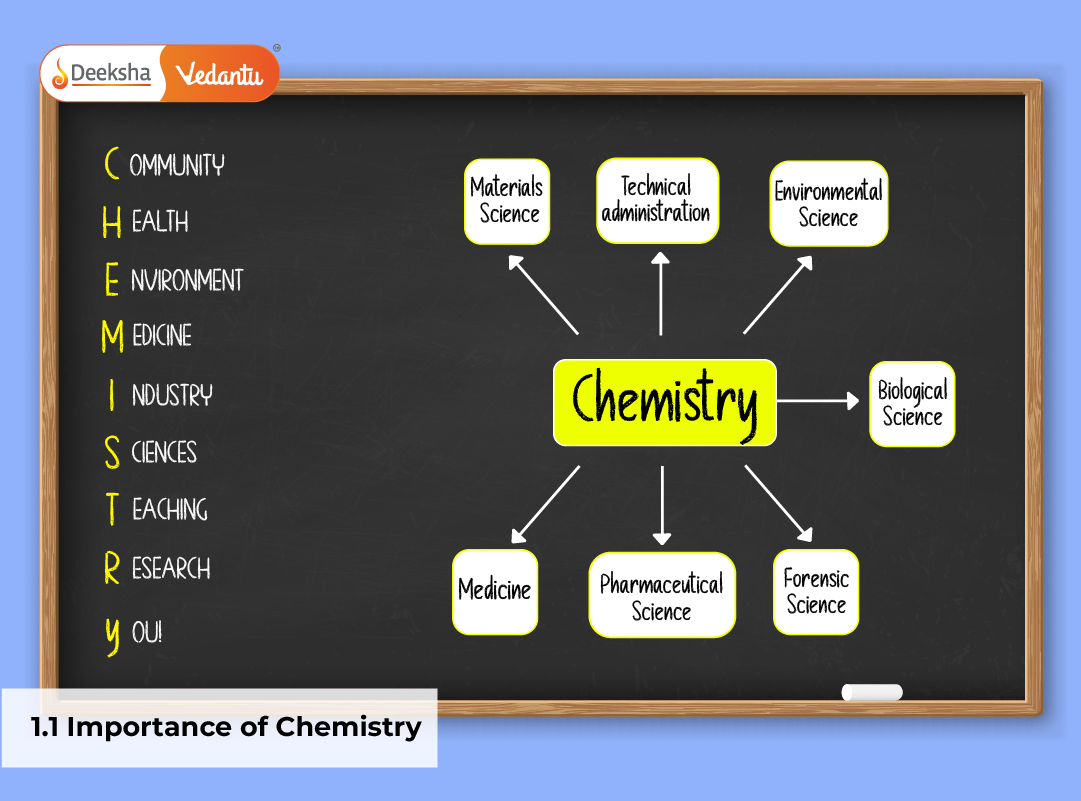
Chemistry is often referred to as the central science because it connects and integrates principles from physics, biology, environmental science, and engineering. It helps explain the composition, structure, and properties of matter and the changes it undergoes. Understanding chemistry allows us to decode natural processes, design new materials, develop medicines, and address global challenges such as pollution and energy crises.
The Central Role of Chemistry in Science and Technology
Chemistry forms the bridge between physical and biological sciences. For instance:
- Physics to Chemistry: Physical laws explain molecular motion, bonding, and thermodynamics.
- Chemistry to Biology: Chemical reactions underpin metabolism, photosynthesis, and DNA replication.
- Chemistry to Engineering: Material sciences, fuel technologies, and polymer chemistry drive industrial innovations.
From nanotechnology to pharmaceuticals, chemistry is the foundation of modern technological advancements.
Applications of Chemistry in Everyday Life
Chemistry plays a vital role in all aspects of daily life. Here are some key examples:
- Food Chemistry: Understanding nutrients, preservatives, and flavor compounds ensures food safety and enhances taste.
- Medicinal Chemistry: Enables the design of life-saving drugs, vaccines, and diagnostics.
- Agricultural Chemistry: Supports crop improvement, fertilizers, and pest control.
- Environmental Chemistry: Helps in pollution control, waste management, and studying climate change.
- Industrial Chemistry: Drives innovation in plastics, textiles, paints, and fuels.
- Energy Chemistry: Advances in battery chemistry, biofuels, and hydrogen energy are redefining sustainability.
Chemistry is thus at the core of human welfare, ensuring progress across medical, agricultural, and environmental sectors.
Chemistry in Human Health and Medicine
Medical sciences rely heavily on chemistry. Understanding biochemical reactions within the body has led to the development of drugs like antibiotics, pain relievers, and anesthetics. Diagnostic tools such as blood tests, MRI contrast agents, and biosensors also depend on chemical principles.
JEE Focus: Understanding chemical bonding, reaction kinetics, and organic functional groups lays the groundwork for topics like medicinal chemistry in advanced studies.
Sample Problem:
If 2 grams of a drug contain 0.5 g of active chemical compound, calculate its percentage composition.
Solution: (0.5/2) × 100 = 25%.
Environmental Significance of Chemistry
Chemistry is crucial in maintaining ecological balance. Atmospheric chemistry studies greenhouse gases, while water chemistry addresses pollution and purification. Waste treatment processes and eco-friendly alternatives rely on chemical reactions to minimize harm.
Applications:
- Designing biodegradable materials.
- Developing catalytic converters to reduce vehicular emissions.
- Understanding ozone depletion and acid rain mechanisms.
JEE Tip: Environmental chemistry carries a consistent 2–3 mark weightage in JEE Main under applied chemistry.
Chemistry in Industry and Material Science
The industrial world depends heavily on chemical principles. Metallurgy, polymer production, semiconductors, and nanomaterials are built upon the manipulation of atoms and molecules.
Example:
- Extraction of metals uses redox chemistry.
- Semiconductor devices are engineered using solid-state chemistry.
- Polymers and synthetic fibers are created via polymerization reactions.
JEE Insight: Questions on chemical bonding, states of matter, and thermodynamics form the base for industrial chemistry applications in exams.
Importance in Research and Innovation
Chemistry drives discovery — from creating new drugs to developing sustainable fuels. Quantum chemistry and molecular modeling have revolutionized our understanding of reactions at the atomic level. AI-assisted chemical synthesis and green chemistry principles now define the future of innovation.
Advanced Applications:
- Development of nanomaterials for sensors.
- Green catalysts for cleaner industrial processes.
- Photochemical systems for renewable energy.
JEE Relevance: Modern chemistry questions often test conceptual clarity in thermodynamics, kinetics, and molecular orbital theory.
Chemistry and Energy
The global energy crisis can be addressed through chemical innovation. Chemistry enables the design of efficient solar cells, hydrogen fuel cells, and advanced batteries.
Key Areas:
- Electrochemistry for batteries.
- Thermochemistry for fuel efficiency.
- Photochemistry for solar energy conversion.
Sample JEE Problem:
Calculate the energy change when 1 mol of hydrogen reacts with 0.5 mol of oxygen to form water, given ΔH = -286 kJ/mol.
Answer: Energy released = 286 kJ per mole of H₂.
Weightage in JEE Exams
In JEE (Main and Advanced), topics related to the “Importance of Chemistry” appear indirectly under applied chemistry, environmental chemistry, and general awareness. While not directly tested as a theory question, understanding its real-world connections strengthens conceptual clarity across:
- Basic principles of chemistry (1–2 marks)
- Environmental chemistry (2–3 marks)
- Applications in chemical bonding and thermodynamics (3–4 marks)
Summary
Chemistry permeates every domain — from life sciences and environment to industrial innovation. Its principles help explain natural processes and drive technological advancements. A clear understanding of chemistry not only aids in exam preparation but also empowers students to solve real-world challenges.
FAQs
Q1. Why is chemistry called the central science?
Because it connects physics, biology, and environmental sciences, explaining the structure and behavior of matter and energy transformations.
Q2. What is the practical importance of chemistry for engineers and doctors?
For engineers, it helps in material development and environmental management; for doctors, it explains biochemical interactions and drug formulations.
Q3. How does chemistry help in solving environmental problems?
Through the development of eco-friendly materials, pollution control reactions, and understanding atmospheric changes like global warming.
Q4. What are the main branches of chemistry studied in JEE?
Physical, Organic, and Inorganic Chemistry — each focusing on reactions, properties, and quantitative relationships.
Q5. How many marks are typically allotted to basic chemistry concepts in JEE?
Around 5–7 marks, often distributed among theoretical and applied questions in both Mains and Advanced papers.
Conclusion
The importance of chemistry extends far beyond the classroom. It forms the foundation for medicine, technology, and sustainable development. For JEE aspirants, mastering its principles provides not only exam readiness but also the scientific mindset needed to innovate and explore. Whether designing cleaner fuels or understanding molecular interactions, chemistry remains the science that transforms curiosity into progress.





Get Social